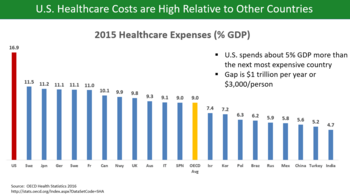The population of Tamil Nadu has considerably benefited, for instance, from its splendidly run mid-day meal service in schools and from its comprehensive system of nutrition and health care of pre-school kids. The message that striking rewards can be reaped from major attempts at institutingor even moving towardsuniversal health care is tough to miss out on.

Perhaps most importantly, it suggests involving ladies in the shipment of health and education in a much bigger way than is normal in the developing world. The question can, however, be asked: how does universal healthcare become budget-friendly in poor countries? Indeed, how has UHC been paid for in those countries or states that have run versus the extensive and established belief that a bad nation must first grow abundant prior to it is able to satisfy the costs of health care for all? The alleged sensible argument that if a nation is bad it can not offer UHC is, however, based upon crude and malfunctioning financial thinking (what is primary health care).
A poor nation may have less cash to invest in healthcare, however it also needs to spend less to provide the exact same labour-intensive services (far less than what a richerand higher-wageeconomy would have to pay). Not to take into account the implications of large wage distinctions is a gross oversight that distorts the conversation of the affordability of labour-intensive activities such as healthcare and education in low-wage economies.
Provided the hugely unequal circulation of earnings in lots of economies, there can be major inadequacy as well as unfairness in leaving the distribution of healthcare totally to individuals's respective abilities to buy medical services. UHC can cause not just greater equity, but likewise much bigger general health accomplishment for the nation, given that the remedying of a lot of the most quickly treatable diseases and the avoidance of readily avoidable ailments get left out under the out-of-pocket system, because of the failure of the poor to manage even really primary health care and medical attention.

This is not to reject that remedying inequality as much as possible is an important valuea topic on which I have written over numerous decades. Decrease of economic and social inequality also has important relevance for great health. Definitive evidence of this is provided in the work of Michael Marmot, Richard Wilkinson and others on the "social determinants of health", showing that gross inequalities damage the health of the underdogs of society, both by undermining their way of lives and by making them susceptible to hazardous behaviour patterns, such as smoking cigarettes and extreme drinking.
Healthcare for all can be implemented with relative ease, and it would be a shame to delay its achievement till such time as it can be integrated with the more complicated and challenging objective of eliminating all inequality. Third, many medical and health services are shared, instead of being exclusively utilized by each specific separately.
The Buzz on How To Take Care Of Your Mental Health
Healthcare, therefore, has strong elements of what in economics is called a "collective great," which typically is extremely inefficiently designated by the pure market system, as has actually been thoroughly gone over by economists such as Paul Samuelson. Covering more people together can in some cases cost less than covering a smaller sized number individually.
Universal coverage avoids their spread and cuts costs through better epidemiological care. This point, as used to specific regions, Visit this website has been identified for a long time. The conquest of upsurges has, in fact, been attained by not leaving anyone unattended in areas where the spread of infection is being dealt with.
Today, the pandemic of Ebola is causing alarm even in parts of the world far from its place of origin in west Africa. For instance, the US has actually taken lots of Visit website pricey actions to prevent the spread of Ebola within its own borders. Had actually there been efficient UHC in the nations of origin of the disease, this problem might have been alleviated and even gotten rid of (who is eligible for care within the veterans health administration?).
The calculation of the supreme financial costs and advantages of healthcare can be a far more complicated process than the universality-deniers would have us believe. In the lack of a fairly well-organised system of public health care for all, many people are affected by expensive and inefficient personal healthcare (what is health care). As has been analysed by numerous financial experts, most especially Kenneth Arrow, there can not be a knowledgeable competitive market equilibrium in the field of medical attention, due to the fact that of what economists call "asymmetric information".
Unlike in the market for lots of products, such as t-shirts or umbrellas, the buyer of medical treatment understands far less than what the seller the doctordoes, and this vitiates the efficiency of market competition. This uses to the market for medical insurance too, because insurance coverage companies can not totally know what patients' health conditions are.
And there is, in addition, the much bigger problem that personal insurance companies, if unrestrained by guidelines, have a strong monetary interest in omitting clients who are taken to be "high-risk". So one way or another, the federal government needs to play an active part in making UHC work. The issue of asymmetric info uses to the shipment of medical services itself.
Indicators on How To Take Care Of Your Mental Health You Need To Know
And when medical workers are limited, so that there is very little competition either, it can make the predicament of the purchaser of medical treatment even worse. Furthermore, when the provider of health care is not himself trained (as is often the case in many nations with deficient health systems), the situation worsens still.
In some countriesfor example Indiawe see both systems operating side by side in different states within the nation. A state such as Kerala offers fairly reputable standard health care for all through public servicesKerala originated UHC in India a number of years back, through comprehensive public health services. As the population of Kerala has actually grown richerpartly as a result of universal healthcare and near-universal literacymany people now choose to pay more and have additional private health care.
In contrast, states such as Madhya Pradesh or Uttar Pradesh offer abundant examples of exploitative and inefficient health care for the bulk of the population. Not surprisingly, individuals who reside in Kerala live much longer and have a much lower incidence of preventable health problems than do people from states such as Madhya Pradesh or Uttar Pradesh.
In the absence of organized care for all, diseases are often allowed to develop, which makes it far more costly http://israelckwf453.iamarrows.com/excitement-about-true-or-false-americans-have-to-forgo-other-goods-and-services-when-more-is-spent-on-health-care to treat them, frequently involving inpatient treatment, such as surgical treatment. Thailand's experience clearly demonstrates how the need for more pricey treatments may decrease sharply with fuller coverage of preventive care and early intervention.
If the advancement of equity is one of the benefits of well-organised universal healthcare, enhancement of efficiency in medical attention is certainly another. The case for UHC is frequently ignored since of inadequate appreciation of what well-organised and economical healthcare for all can do to enhance and enhance human lives.
In this context it is also essential to keep in mind an important pointer contained in Paul Farmer's book Pathologies of Power: Health, Human Rights and the New War on the Poor: "Claims that we reside in a period of minimal resources fail to mention that these resources happen to be less minimal now than ever before in human history.